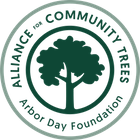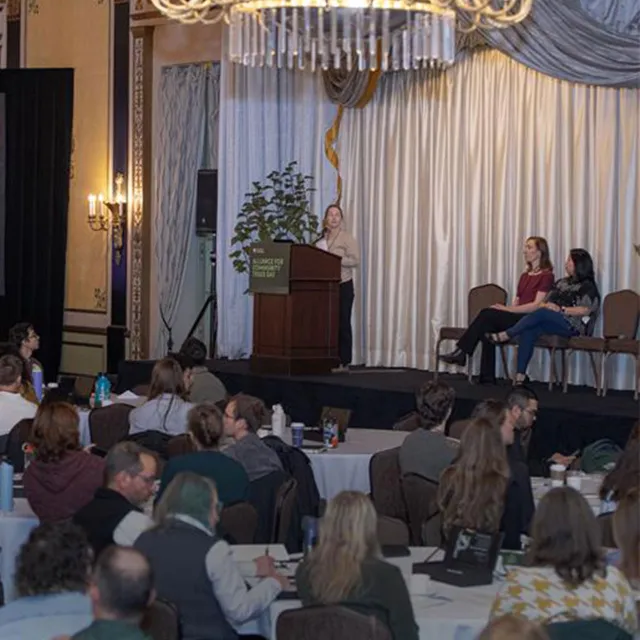Now live: The 2025 Canopy Report. Learn how Americans see trees. GET THE REPORT
Alliance for Community Trees Day
November 18, 2025
Join us at ACT Day to network, learn, and be inspired by members and other industry professionals as we strengthen this network and industry – together.

Location
Henderson, NV
Date
November 18, 2025
Type
Event

Presented by the Arbor Day Foundation
Announcing the 2025 Alliance for Community Trees Day on November 18, 2025.
The Alliance for Community Trees Day brings together the dedicated members, passionate individuals, and communities at the heart of urban forestry. This special event highlights their commitment to exploring innovative solutions, sharing valuable insights, and collaborating to shape the future of green, thriving urban landscapes. Join these leaders as they strengthen the bonds between people and trees, champion sustainable practices, and drive meaningful change. Sign up for our emails to stay in the loop as the conference approaches!
Member Rate: $199 | Non-Member Rate: $299
Tuesday, November 18
2025 Agenda
7:30 a.m. - 8:30 a.m. | Breakfast
Hear from urban forestry leaders as we kick off the conference.
Green to Gold: Scaling Programs for Growth | Elektra Fike-Data, Executive Director, Tree San Diego
Multi-year projects come with challenges — but also immense opportunities. This presentation explores innovative strategies for proposing, scaling, and sustaining impactful programs for multi-year cycles. Through case studies of varying programs like Tree San Diego’s Treejectory, Branch Out San Diego, and Leafing Our Legacy, this session highlights innovative approaches to funding channels, partnerships, and lessons learned. Attendees will leave with actionable steps and fresh perspectives with which to navigate future projects in an ever-growing sector.
Funding Urban Forestry in Partnership with Business Districts | Lauren Davis, Friends of Grand Rapids Parks
Creating and utilizing fee-for-service contracts with collaborating business districts to fund tree planting and maintenance throughout your city.
Building Community — Lessons from a Capital Campaign | Jessica Sanders, Ph.D., Sacramento Tree Foundation
Building community spaces is a challenge on many levels. The Sacramento Tree Foundation had a vision of building a Japanese-style cherry tree park on the Sacramento River and embarked on a capital campaign in order to make this vision a reality. Many times, recognizing the implementation work between the vision and the completed project can be daunting and is often left behind once the project comes to fruition. This presentation will discuss the implementation challenges, hurdles, successes, and partnerships in the hopes to help future organizations.
Funding Urban Forestry Q&A
Take a mid-morning break in the exhibit hall and enjoy light refreshments. It’s the perfect chance to recharge, connect with exhibitors, and catch up with fellow attendees before the next session.
Depaving Nashville to Create Urban Tree Canopy | Jason Sprouls, Cumberland River Compact
The Cumberland River Compact is a water resources nonprofit organization based in Nashville, TN. Since 2017, the Compact has been “depaving” Nashville by removing underutilized asphalt and concrete to restore it with urban tree canopy. So far, the Compact has depaved over 85,000 square feet of Nashville, making our Depave initiative one of the two largest in the United States. Depaving even a small part of a large paved area can combat environmental problems associated with urbanization — namely, stormwater runoff and the urban heat island effect.
Stewardship as a Safeguarding Strategy | Meg Morgan, Groundwork USA
Resident tree stewards build neighborhood cohesion, increasing local pride and resilience. While community-building should always remain a core purpose of resident stewardship programs, this approach also brings other organizational and community benefits: protecting our investments (the trees!) over the long-term. This is an especially useful strategy in the midst of funding uncertainties. Hear examples from the Groundwork Network of how resident stewardship supports and safeguards plans for multi-year projects within community-based nonprofits.
Sustaining Urban and Community Forestry Q&A
Connect with fellow attendees over inspired food and drink options.
Creating Green Infrastructure Corridors | Matthew Thomas, TreesLouisville
Since 2018, TreesLouisville has built a strong partnership with the Kentucky Transportation Cabinet (KYTC), an unprecedented collaboration between a state agency and a nonprofit for tree planting on state property. Initially focused on highways and gores (on/off ramp loops), the partnership has grown. KYTC now recognizes trees as vital green infrastructure and has begun allocating funds to support their expansion, reinforcing the role of urban forestry in transportation planning.
Stop, COLLABORATE & Listen | Dina Haveric and Molly Stuelke, Trees Forever
After the 2020 derecho destroyed 70% of the tree canopy in Cedar Rapids, Iowa, the City of Cedar Rapids & Trees Forever came together to build back the canopy in a public-private partnership called ReLeaf Cedar Rapids. The City focuses on the public side of the plan while Trees Forever focuses on the private side. Explore the plans and projects laid out in the 10-year program and how they work together to make the biggest impact. They need the community to believe in their mission just as much as they do. What's working for them to achieve community buy in?
Branching Out: Growing Institutional Partnerships, Accomplishing Common Goals | Tom Ebeling, Openlands
Hear about the path to partnership between Openlands and three long-standing Chicago institutions. This collaboration emphasizes the importance of identifying mutual goals and supporting the priorities already in place within these institutions by making funding, technical expertise, and collaborative opportunities available. This integrated approach fosters long-term partnerships and ensures that community forestry becomes embedded in the broader culture, planning, and environmental strategies of the partnering institutions.
Partnering in the Urban Forest Q&A
Your Trees, Your Story, with i-Tree | Ana Castillo, The Davey Institute
Quantifying the benefits of your community’s trees with i-Tree can help you effectively tell your story to demonstrate how planting and caring for trees is an impactful, cost-effective strategy to address multi-faceted problems. Learn how others are using the i-Tree suite of tools to capture the impact of their projects and engage new audiences and potential funders.
Leveraging GIS for Urban and Community Forestry | Lukasz Czerwinski, Esri, and Derrick Frese, Arbor Day Foundation
GIS empowers nonprofit organizations of all sizes to better communicate their cause, understand their community, act on their mission, and measure their impact. It also helps them extend services, attract volunteers, expand their donor network, and shape public policies. Join this session to learn how nonprofits and community organizations can leverage GIS to unlock the full potential of data to improve operational and business results.
Trees and Technology Q&A
Take a moment to relax or explore the Exhibit Hall — connect with exhibitors, discover new tools and resources, and network with fellow attendees in a relaxed setting.
Gals Who Garden | Lindsay Cutler and Evon Lopez, The Park People
In Valverde, at Denver's High School for teen moms, there are two career tracks: phlebotomist and esthetician. Local leader and Community Connector Evon Lopez knew her formerly redlined neighborhood had high heat, low tree canopy, and was in a food desert. She saw the opportunity to tackle all these issues in one ambitious project. Gals Who Garden is a school garden, food forest, and work-study initiative brought to life through clear vision, sustained partnership, and cross-sectional collaboration. Ground broke in Spring 2025, despite the odds.
Engaging Faith Communities in Forestry | Surya Lee, Tree Pittsburgh
In Allegheny County, much of the land suitable for reforestation is private land, which often presents a funding and capacity barrier. Faith congregations steward a vast amount of private land in Pittsburgh and are central to the social infrastructure of a community. Many faith communities already hold a strong connection to the environment and consider environmental stewardship a key part of their faith. With this in mind, Tree Pittsburgh and our partners are building out our work with faith communities and have insights that others may find helpful.
Cultivating Community: Bringing Residents into the Urban Forest | Tyrah Cobb-Davis and Ray Stieber, Baltimore Tree Trust
Baltimore Tree Trust (BTT) is on a mission to grow and protect Baltimore City's urban forest through increased tree planting, community engagement and stewardship of city trees. BTT is committed to advancing outreach and engagement efforts customized to meet the needs of the diverse communities we serve. We aim to provide examples of how we engage and build trust within communities and hope to highlight that the impact of the urban forest is not only determined by the number of trees planted, but also by the number of people that engage with our mission.
Community Engagement Q&A
More details coming soon!
Matt Spitsen, Arbor Day Foundation
Wrap up the day with a relaxed evening at our networking reception, hosted at the top floor of the M Resort. Enjoy breath-taking views of the city as you mingle with fellow attendees in a casual, social setting.

Event Information
For over 30 years Alliance for Community Trees (ACT) members have planted, cared, and advocated for trees, changing the landscape of our community habitat. Join us this year at ACT Day to network, learn, and be inspired by members and other industry professionals as we strengthen this network and industry – together.
This meeting offers:
- Peer-to-peer learning opportunities
- Networking
- Educational sessions
- International Society of Arboriculture Continuing Education Units

2025 Speaking Portal
Thank you to everyone who submitted a speaking proposal for the 2025 Alliance for Community Trees Day! Selected speakers may log into the portal below to submit final presentations no later than November 4, 2025 at 11 p.m. CST.
2025 Sponsor
Platinum Sponsor
Sign up
Stay Informed
Get the latest on conference and workshop details, exhibitor and sponsorship opportunities, and chances to connect with leaders in community forestry.
